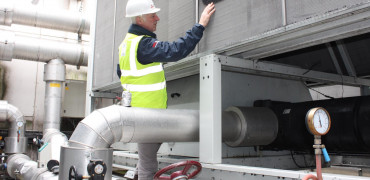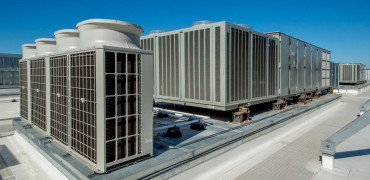New regulations on indoor air quality, monitoring, energy efficiency and low-carbon buildings are on the horizon, and good service and maintenance will help building managers meet the new challenges. Head of Service and Maintenance, Geoff Turton explains more
As we head into 2022, several significant areas of legislation are due for updates that will push forward important government policies including the net zero emissions 2050 goal and improvement of indoor air quality in our workplaces.
The Committee for Climate Change (CCC) states that direct greenhouse gas emissions from buildings were 85 MtCO2e in 2019. This is around 17% of the UK’s total emissions.
So, we must ensure that our buildings are designed and operate efficiently.
Low-performing buildings will require a lot of work in the next eight years or so to reach the new standard
Part L update
Part L (energy efficiency) of the Building Regulations is due for substantial updates in 2022.
Government wants to encourage the construction industry to develop lower-carbon buildings as soon as possible and to prepare for more stringent carbon reduction requirements in the future.
The government’s preferred option is for an interim Part L that delivers a 27% reduction in carbon emissions on average per non-domestic building compared to the current standard.
Another important proposal is to extend the commissioning requirements in Part L and make them much clearer by providing a dedicated section in the updated version.
This reflects government’s view that high performing services in buildings can only be effective if the services are “tested and adjusted properly after installation".
Minimum energy standards
Another hugely influential change is to the Minimum Energy Efficiency Standards (MEES).
These already require a minimum Energy Performance Certificate (EPC) rating of F for rented commercial property.
But from 2030 the new minimum will be a B.
Low-performing buildings will require a lot of work in the next eight years or so to reach the new standard.
Displaying your energy certificate
And it’s not only national legislation that is putting the focus on energy efficiency in buildings.
The London Plan, for example, requires Display Energy Certificates (DECs) on all ‘major developments’.
What’s more, these developments will have to provide energy monitoring data for five years after completion.
The data will be gathered in an online system so that the Authority can identify ‘good practice’.
We can see that there are serious implications for building services as the largest energy users in commercial buildings.
Ensuring that equipment such as chillers operate at optimum efficiency is going to be front-and-centre in meeting these challenging targets.
Focused on the needs of clients
At Mitsubishi Electric Service and Maintenance, we have been focused for some time on helping our clients meet their energy efficiency goals.
Not only that, but our expert engineers can be there to help for the whole lifecycle of equipment from system design and commissioning to onsite engineer response and maintenance programmes.
We also use the latest technology for in-field reporting and diagnostics. This level of technical support means that we can keep products working at their optimum, delivering great performance and energy efficiency.
As regulations on energy use (and the cost of energy) become more pressing, Mitsubishi Electric is working with a growing number of clients to help them develop a planned preventative maintenance programme (PPM).
This provides the reassurance that our team is always on-hand to deal with potential issues before they become problems – and to help FM teams keep buildings running at their most efficient.
Geoff Turton is Head of Service, Maintenance & After Sales Technical




